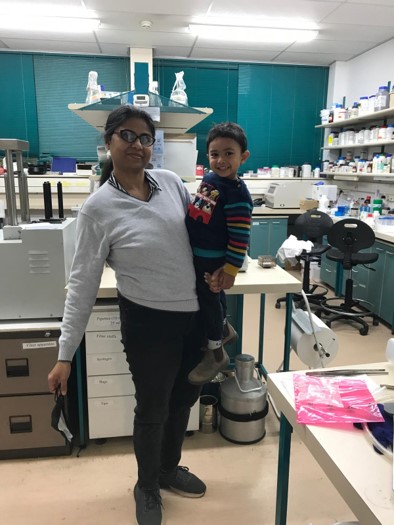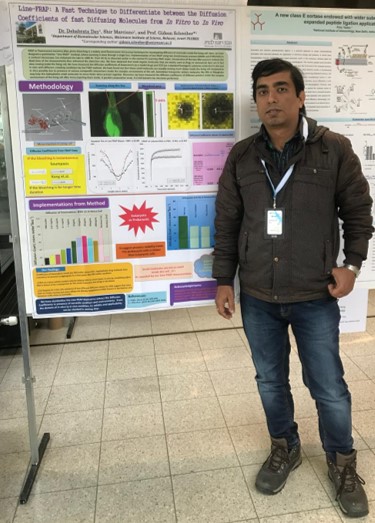The Dilemma of Early-Career Scientists in Developing Countries
Published in Education

We are the first graduates and PhD in our families. Therefore, our passion and love for science was self-driven. And this is what brought us close, and we got married.
As we finished our respective Ph.Ds. in India and went abroad for post-doctoral studies there are a few perceptions that we came across. In India, where resources are still limited compared to demand, researchers always choose their area that will give them immediate results, publications, or patents. Years back when we began our Ph.D. it was not much dissimilar. Industrial jobs were rare (except for some organic chemistry laboratories), all innovative/unique research field labs had hardly found any students. After PhD labs, the role of PI was every researcher’s dream. We were also not an exception to this, because we had not seen the other side of the world by then.
We, then moved to the Weizmann Institute of Science, Israel, for our post-doctoral trainings and would consider ourselves lucky because we got to work with some brilliant minds in an environment where free thinking was allowed. We both plunged into research problems which was something new and absolutely different from what we had done during our Ph.Ds. At Weizmann we learned that academia trains a student and makes them skilled for their next assignments, which is necessarily not an academic PI job. This general message remains missing in Indian academia.

Dr. Tanaya Bose with her son in her postdoctoral laboratory during the pandemic period
After finishing Ph.D., most students go for post-doc training in western countries and are caught up in the post-doc loop for years. Those who manage an industry/academic job after going through the pain of immigration hurdles in a foreign country are considered lucky. Post-doc positions in all countries are a cheap academic workforce without a basic social security clause. When this cheap academic work tenure (let's say 5 years) finishes, a post-doc with work experience of 5 years becomes expensive, and continuing the same job becomes extremely tough. They have two options: either return to their motherland without a job or look for another post-doc, which becomes a prolonged loop.

Dr. Debabrata Dey presenting his research from his postdoctoral days
Then comes the biggest hurdle of their lives. For a PI position in South Asian countries, usually have an age limit and in an effort to publish well one easily crosses this limit, and our case was even worse. First, the COVID-19 pandemic and then, unfortunately, the war situation in Israel delayed all our academic planning. We were punished for mistakes that we did not make. It is not the expertise, but the age criteria that becomes the primary judgment factor during the first screening. The question is, is it logical?
In a sense, in developing countries where resources are limited but demand is high, this age limitation is an effective parameter for reducing the number of people entering academia. If one chose a risky, unique field of research, the chance of success is lower and takes longer. We understand now, why there were huge queues during our Ph.D. in front of laboratories, which publishes frequently in a popular, flashy field. To give one a feasible chance in academia, they can successfully tick all the boxes necessary for an academic job application. The ratios become 1:100 to 1:500 in some places during academic hiring. For sure, this is not a sustainable model.
It is essential that skill-based training be followed so that after a Ph.D., their employability in any R&D research jobs goes up. And if you survive this situation and manage to get a PI position in India there comes the next hurdle of funding. Often, within a couple of years of joining, publications are demanded by higher authorities which is impossible if ample time and funds are not invested.
For example, in Israel, we observed a distinct difference, even during master's training and certainly during PhD tenure, where students are highly focused on the scientific problem and solving its root cause, rather than pursuing publication-driven science from the beginning. This system allows them to think and understand better and makes them capable of taking on challenges outside academia. Papers and patents are the byproduct of rigorous scientific training.
In Indian science, the question remains how to attract new students to PhD programmes in challenging fields, where easy, quick papers will not be guaranteed. This is up to the new incoming PIs, universities, research institutes, and research bodies to encourage students and young researchers for their achievements (even if they are small), provide adequate facilities, and provide financial stability so that they can pursue their science studies for longer.
As a new PI, we both aim to pursue research that leads to real innovations and to develop their skills to meet global standards, thereby sustaining their employability beyond academia. However, the question is whether the system will permit the pursuit of a skill-driven, knowledge-oriented model in today's academia (publish or perish) — only time will tell.
Competing Interests
The authors declare no competing interests. (Poster image is generated by ChatGPT open AI)

Please sign in or register for FREE
If you are a registered user on Research Communities by Springer Nature, please sign in
As an early-career researcher and physician from a developing country, I strongly resonate with your reflections. In clinical and surgical research, I often face the same tension between pursuing quick, publishable results and investing in deeper, riskier questions that could truly improve patient outcomes.
Your point about skill-oriented, problem-driven training is crucial. it equips young scientists and clinicians not just for academia but also for broader impact in healthcare and innovation. Thank you for articulating these challenges so candidly; it’s a powerful reminder that systemic change is essential to nurture the next generation of researchers.
Thank you, Hossein, for sharing your thoughts and experience. Nurturing the next generation of researchers is crucial, especially as academia is already struggling with the growing problem of paper-mill syndrome. If we do not act now, the damage may become irreversible. It is our responsibility to prioritize skill-oriented and problem-driven training, because without it, the entire research ecosystem risks collapse.
What can we do as a community to initiate change?
I do not have a clear answer, Maria. But it is important to make early-career researchers—especially students—aware that skills matter more than publication-driven science. Papers are simply by-products of the work we do. Ultimately, it is skills that secure jobs, whether in academia, industry, or other sectors. Science today is vastly different from what it was 20 years ago. It is wiser to listen to senior postdocs and early-career PIs before committing to long-term career plans in academia.